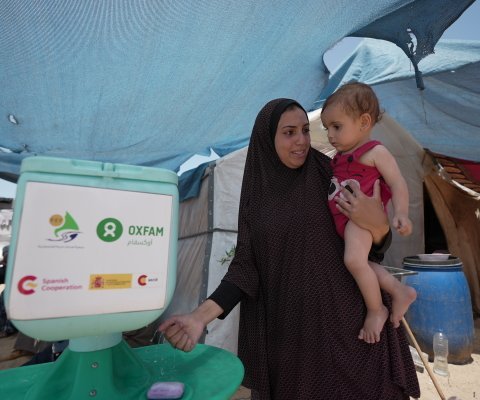Washington, D.C. — A new report by Oxfam America and the Tahirih Justice Center documents how common it is for migrants seeking asylum to experience gender-based violence in Mexico while waiting to access the asylum process in the U.S.
In Surviving Deterrence: How U.S. Asylum Deterrence Policies Normalize Gender-Based Violence, Oxfam America and Tahirih explain how US asylum deterrence policies, such as border closures and expulsions, exacerbate conditions that cause gender-based violence to proliferate at the southern border. The report further asserts that survivors who do manage to apply for asylum face an inequitable and re-traumatizing process on a systemic level.
“The risk of violence at the border for women, girls, and LGBTQI+ people is so high that they have reportedly come to expect it as a condition of seeking asylum in the US,'' said Irena Sullivan, Senior Immigration Policy Counsel at the Tahirih Justice Center. “By abandoning its punitive, deterrence-based approach to asylum, the US can uphold its legal and moral obligations to protect rather than endanger those who are particularly vulnerable to begin with.”
“Racialized policies of migration deterrence, which have become the cornerstone of US asylum and immigration policies, actively increase the risk of gender-based violence for women, girls, and LGBTQI+ individuals seeking asylum at the US southern border,” said Sara Duvisac, Research and Policy Advisor and ACLS/Mellon Public Fellow at Oxfam America. “The US asylum system, rather than protecting the most vulnerable, often systematically harms those seeking protection, in gendered and racialized ways.”
The report lists a set of recommendations for how the US government can replace its punitive, deterrence-based approach to asylum with one that centers those in need of protection. For example, in place of deterrence policies, the report urges the US to invest in ‘Welcome Centers,’ where asylum seekers can access legal and humanitarian resources. It must also fully implement robust trauma-informed policies and practices across all US agencies that interface with those seeking asylum.
Other recommendations include eradicating racial bias across all US immigration agencies, explicitly recognizing gender as an independent ground of asylum, supporting alternative pathways for processing refugees, and aligning US immigration and asylum policies with US foreign policy goals that seek to promote women’s economic and social empowerment.


